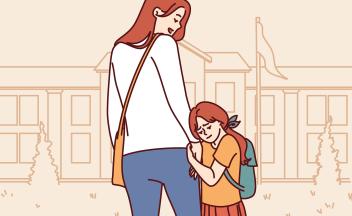The effects of falling behind in reading and feeling like a failure can take a large toll on kids. Children can lose all desire to learn to read or go to school. Some begin to act out in class or set low expectations for themselves.
Madeline, an appealing 8-year old at the Lab School in Washington, D.C., remembered what it was like before she was given intensive help with reading:
I just couldn’t read the words that were in the books we had to read. I always felt left out. And a lot of the mornings when it was time to get up and go to school, I kept saying, ‘No, no. I don’t want to go.’
Reading difficulties can have a significant impact on a child’s self-esteem. Children who struggle with reading may feel embarrassed, frustrated, or ashamed, which can lead to a negative self-image and lower their self-confidence.
You can help your child by supporting and encouraging their efforts. Let them know it’s okay to make mistakes and celebrate their progress, no matter how small! Focus on what they do well rather than dwelling on their weaknesses. Getting extra help from a tutor or reading with your child at home may help your child improve and build their confidence. Remember having an open and flexible mindset can make all the difference for someone struggling to learn to read.
Although the best remedy for a child’s low self-esteem about reading is, of course, to teach him or her how to read, there are other things that can help.
Self-esteem and children who struggle with reading
Imagine getting up each day to go to a job in which you felt incompetent and unsuccessful. A job in which you struggled every day to meet basic goals, in which you felt incapable amongst your coworkers, and your boss gave you constant feedback that your performance was sub-par.
Most adults would flee such a negative work environment, but children have no alternative but to continue being employed in the work of learning how to read.
Learning how to read is truly important work. And while you share with your child or student the value of and an appreciation for reading, it is also important to be explicit in conveying an appreciation for the intensity of his or everyday struggle to become a reader and for his or her worth as a person.
Many children with learning differences do constant battle with frustration, anger, and defeatism. Struggling to learn how to read can be emotionally as well as mentally exhausting. It’s a struggle that can affect almost every aspect of a child’s school experience, from academics to relationships with peers, to feelings of self-worth.
Put downs & comebacks
Learn how to respond to a discouraged kid so he or she keeps trying. Put Downs & Comebacks includes six typical “put downs” a child who is struggling may say or think about himself as well as suggested “comebacks” you can say to turn these negative thoughts and feelings around.
“Put Downs & Comebacks” offers many suggestions on how you can address a child’s negative feelings about self or school. By doing so, you’ll help a child more readily reach his or her fullest potential. Most importantly, you’ll let your child know what you’ve always felt — that you believe in your child and that you are his or her biggest fan.
“Put Downs & Comebacks” was written by Mia French for Reading Rockets. Many thanks to Dr. Louise Spear-Swerling for her review.
Self-advocacy
Certain kids can also advocate for themselves. Discuss with children how to explain their difficulties to teachers and other students, and provide them with advice on what types of help they can ask for in the classroom.
Children are, of course, much more than how they do in school. You are your child’s biggest fan. No matter what, let them know how much you value them just the way they are!
